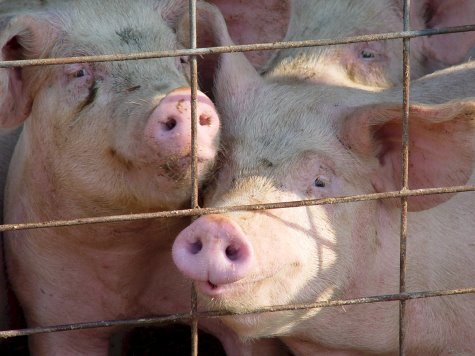
Agricultural News
New Research: Using Less Bedding Can Benefit In-Transit Market Pigs
Wed, 04 Jan 2012 06:28:59 CST
 In a new study, funded by the Pork Checkoff, researchers at Texas Tech and Iowa State universities found that the pork industry can generally use less bedding year-round that it currently does while improving overall animal well-being - a breakthrough finding that could save the industry an estimated $10.1 million per year.
In a new study, funded by the Pork Checkoff, researchers at Texas Tech and Iowa State universities found that the pork industry can generally use less bedding year-round that it currently does while improving overall animal well-being - a breakthrough finding that could save the industry an estimated $10.1 million per year.
John McGlone, a swine researcher at Texas Tech University and principal researcher for the study, along with Anna Butters-Johnson an Iowa State University researcher, looked at various rates of bedding in semi-trailers at different times of year and in different locations throughout the Midwest. This approach provided data representing cold, mild and hot weather.
Specifically, the research trials showed that groups of pigs headed to market can experience lower mortality rates in warm weather and overall improved well-being year-round when less bedding is used in transport trailers. According to McGlone, the current standard in the industry is to use four bales of bedding per semi-trailer.
"During the study we found that the surface temperature of the pigs changed with the air temperature and that increased surface temperature actually caused a negative effect on the pigs' welfare," McGlone said. "In cold weather, we found that there is no added effect to using more than six bales of bedding per trailer."
McGlone explained that freezing temperatures cause used, wet bedding on the trailer beds to freeze, which means pigs are more likely to slip on the ice, thereby creating more down pigs. While in warm or mild weather, they found no added effect in using more than three bales of bedding per trailer.
"We concluded that if the industry changed to using only three bales per trailer, it would create a big savings with no change in welfare," McGlone said. "So it's something the industry will need to consider carefully."
Karen Richter, a pork producer from Montgomery, Minn., and a National Pork Board member, said, "This bedding research offers us as an industry win-win situation because the results show that we can continue to improve animal well-being practices and actually save money at the same time."
According to Sherrie Niekamp, Checkoff's director of swine welfare, the pork industry overall is doing a good job of transporting its roughly 2 million pigs per week in a safe and pig-friendly way. Statistics back up this assessment, with more than 99.3 percent of pigs sent to market arriving in good condition.
However, the small percentage of transport losses that occur, according to previous research done by the University of Illinois, still represents a total annual industry economic hit of $46 million. This includes losses from fatigued pigs (non-ambulatory), mortalities and other losses at plants.
"We're excited about what this research can mean to the industry on many fronts," Niekamp said. "It's always a good day when we can find innovative ways to continually improve how we care for pigs during all phases of production, including transportation."
According to Niekamp, the Transport Quality Assurance® task force will take this new research into consideration when updating the program's transport recommendations. The current TQATM Handbook is online at pork.org.
In the meantime, McGlone says producers should evaluate their current bedding practices and determine if they can implement the study's protocols. He said, "We've clearly shown there is no advantage to using more bedding than is necessary."
WebReadyTM Powered by WireReady® NSI
Top Agricultural News
More Headlines...




















